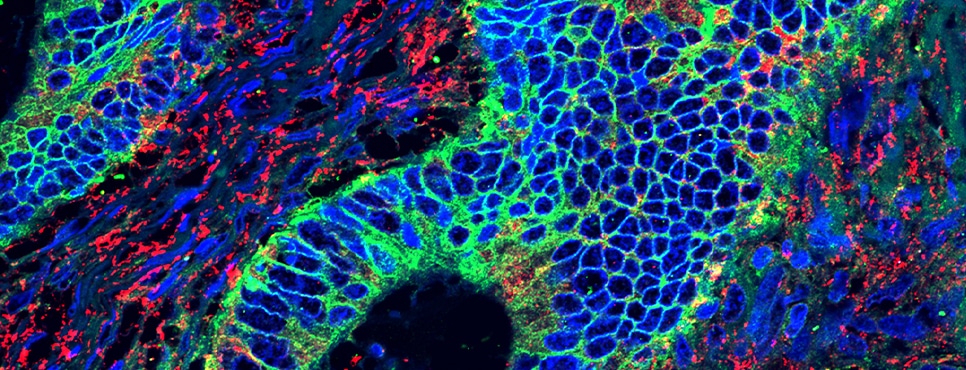Program
[U] – Not available for on-demand viewing
[R] – Remote Presentation
Friday, October 21
Registration
3-8 p.m.
Welcome and Opening Keynote Lecture
6:30-7:30 p.m.
Keynote Lecture
Stromal evolution in inflammation and cancer [U]
Shannon J. Turley, Genentech, South San Francisco, California
Opening Reception
7:30-9:30 p.m.
Saturday, October 22
Breakfast
7-8 a.m.
Plenary Session 1: Adoptive T Cell Therapy with a Focus on Challenges in Solid Tumors
Session Chair: Thomas F. Gajewski, University of Chicago, Chicago, Illinois
8-9:25 a.m.
Engineering CAR T cells for enhanced efficacy and specificity
Robbie Majzner, Stanford University School Medicine, Stanford, California
TCR-gene therapy targeting mutant KRAS
Eric Tran, Providence Cancer Institute, Portland, Oregon
Break
9:25-9:45 a.m.
Plenary Session 2: Next-Generation Checkpoints Beyond PD-1 and CTLA-4
Session Chair: Roberta Zappasodi, Weill Cornell Medicine, New York, New York
9:45-11:45 a.m.
Targeting the LAG-3 immune checkpoint in cancer
Evan J. Lipson, Johns Hopkins Bloomberg-Kimmel Institute for Cancer Immunotherapy, Baltimore, Maryland
Targeting the adenosine pathway to augment the immune response
Zev A. Wainberg, UCLA Medical Center, Santa Monica, California
Modulating tumor metabolism to reprogram the immune microenvironment against cancer
Roberta Zappasodi
Lunch on Own / Free Time
11:45 a.m.-1:45 P.m.
Plenary Session 3: Spatial Analysis of the Tumor Microenvironment
Session Chair: Roberta Zappasodi, Weill Cornell Medicine, New York, New York
1:45-3:45 p.m.
The power of ONE: Immunology in the age of single cell genomics [U]
Ido Amit, Weizmann Institute of Science, Rehovot, Israel
Cancer rearranges the rules in tissue building blocks. A new class of targets for therapy? [R]
Garry P. Nolan, Stanford University School of Medicine, Stanford, California
Integrating multi-omics to unlock insights into cancer immunotherapy against hepatocellular carcinoma
Won Jin Ho, Johns Hopkins University, Baltimore, Maryland
Poster Session A / Reception
4:00-6:30 p.m.
Sunday, October 23
Breakfast
7-8 a.m.
Plenary Session 4: Computational Models/AI/Big Data
Session Chair: Jennifer A. Wargo, The University of Texas MD Anderson Cancer Center, Houston, Texas
8-10 a.m.
Systems biology modeling of tumor immunotherapy
Lance L. Munn, Massachusetts General Hospital, Charlestown, MA
Immune selection and predictability of cancer evolution
Marta Luksza, Icahn School of Medicine at Mount Sinai, New York, New York
What about cancer is “not self”?
Benjamin D. Greenbaum, Memorial Sloan Kettering Cancer Center, New York, New York
break
10-10:20 a.m.
Plenary Session 5: Host Factors Regulating Efficacy and Resistance
Session Chair: Jennifer A. Wargo, The University of Texas MD Anderson Cancer Center, Houston, Texas
10:20 a.m.-12:20 p.m.
Insights from translational research on response to cancer therapy
Jennifer A. Wargo
Elucidating the impact of the microbiome on CAR T cell therapy
Melody Smith, Stanford University, Stanford, California
An unexpected role for androgens in limiting cancer immunotherapy efficacy
Amy Moran, Oregon Health & Science University, Portland, Oregon
Lunch on own/free time
12:20-2:30 p.m.
Plenary Session 6: Myeloid (and other – maybe) Cells in the Tumor Microenvironment
Session Chair: Thomas F. Gajewski, University of Chicago, Chicago, Illinois
2:30-3:40 p.m.
The complexities of tumor associated macrophages and the key to effective targeting for anti-cancer therapy
Jennifer L. Guerriero, Dana-Farber Cancer Institute, Boston, Massachusetts
Commensal microbiota and germline variants can regulate anti-tumor immunity through myeloid cells [U]
Thomas F. Gajewski
Keynote Lecture
3:40-4:40 p.m.
Introduction of Keynote Speaker
Amy Moran, Oregon Health & Science University, Portland, OR
Sex bias and cancer immunotherapy: Time has come
Zihai Li, The Ohio State University – Pelotonia Institute for Immuno-Oncology, Columbus, Ohio
Poster Session B/Reception
5-7:30 p.m.
Monday, October 24
Breakfast
7-8 a.m.
Plenary Session 7: Mechanisms of IO Toxicity
Session chair: Ryan J. Sullivan Massachusetts General Hospital, Boston, Massachusetts
8-10 a.m.
Checkpoint blockade–induced dermatitis and colitis are dominated by tissue- resident memory T cells and Th1/Tc1 cytokines
Robin Reschke, University of Chicago, Chicago, Illinois
ICI-associated myocarditis: Bench to bedside
Javid Moslehi, University of California, San Francisco, California
Uncoupling anti-tumor immunity and auto-inflammatory toxicity from immune checkpoint inhibition
Ryan J. Sullivan
Break
10-10:20 a.m.
Plenary Session 8: Neoadjuvant IO
Session Chair: Matthew Galsky, Icahn School of Medicine at Mount Sinai, New York, New York
10:20-12:20 p.m.
Personalization of neoadjuvant therapy in melanoma – a template for other tumors?
Christian Blank, Netherlands Cancer Institute, Amsterdam, Netherlands
The evolution of neoadjuvant immunotherapy in bladder cancer
Matthew Galsky
From the clinic to the lab: Investigating mechanisms of response and resistance to
immune checkpoint therapy [R]
Padmanee Sharma, The University of Texas MD Anderson Cancer Center, Houston,
Texas
